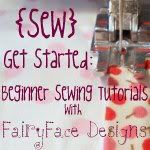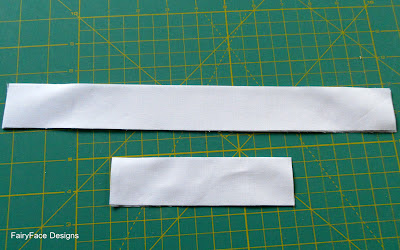Today's post is an introduction to quilting for those of you who haven't tackled it before. We have covered a lot of the essential skills in previous tutorials, including cutting, piecing and binding. So today, we are going to put those together and learn how to make a little quilted mug rug. I'm calling it my Slice of Cake, as the little wedge shapes remind me of exactly that. And what are mug rugs more perfect for than holding your cup of tea and a slice of cake?
Mug rugs or placemats are great projects to make when you are learning to quilt. Their small size makes them manageable to work with and because you don't have too much time or fabric invested in them, you don't have the fear of messing them up that I think everyone has when they are quilting for the first time on a bigger project.
This tutorial is part of the {Sew} Get Started: Beginner Sewing Tutorials series. For a full list of tutorials and links to past tutes, please click on the link to take you to the master page:
So let's get started!
Materials Required:
5 coordinating scraps of fabric at least 4" x 6" and a large scrap/ Fat Eighth of solid fabric for borders.
Fabric for backing - approx 14 x 8"
Fabric for binding
Large scrap of batting
Curved safety pins for basting, or basting spray
To Make:
First, make a template to cut your wedge shapes. I have made this mug rug a few times, and always end up with a slightly different size. For this one I drew my wedge as per the measurements in the picture below (using squared or graph paper really helps draw this accurately). You just need to make sure your top line is centred. Then cut your template out.
Press your fabric scraps and decide what order you want them in. Then stack them on top of each other, with the 2nd and 4th ones turned upside down. You can see what I mean here (obviously when cutting I lined them up properly, this is just to show how they were arranged).
If you are using fabric with a directional print, make sure you have it arranged correctly before cutting. It helps if you press your stack of fabric with an iron before cutting, it helps to stop them from moving around.
Place your template on your fabric, and lining up your cutting ruler with the edge of the template, cut out your shapes.
Now, lay out your pieces as you want to sew them. Take the first two, and place right sides together, lining up the corners.
Sew using a 1/4" seam. Without taking out the first piece, feed through your next 2 pieces and sew in the same way. (This is called chain piecing, a really useful technique for quick piecing).
Now, clip your threads, and sew these two parts together, and add the last wedge to the end. Press your seams open. Don't worry if the edges are a little wonky, next step will fix that!
Trim into a rectangular shape.
First straighten up the two long edges, and then use the lines on your ruler to cut a straight line up from the corner on each side to give you a rectangle. This should measure approx 5.5" x 11".
Next you need to cut your border pieces. You need 2 pieces 5.5" x 1.5", and 2 pieces 13" x 1.5".
Piece the shorter border pieces to each end of your rectangle, then piece the long pieces across each of the long edges using 1/4" seams. Trim to neaten up and ta dah! Your quilt top is done.
Doesn't it look pretty? Next we need to prep it for quilting.
Get your scrap of batting, and smooth it out. For something this small, you don't really need to tape it down or stretch it, but you can if you wish. Place your mug rug top on top of the batting and smooth it out so that it is taut on the batting, but not stretched or distorted. You should have at least half an inch of batting showing around all the edges, more if possible.
Flip it over and do the same with your piece of backing fabric. Make sure that you have it lined up so that the print pattern sits nice and straight on it. Now, use your pins to pin all three layers together in the middle of each of the wedges, or if you have basting spray give it a quick squirt to secure.
Now you need to mark your quilting lines. For this, I first marked a half inch on either side of my diagonal lines, and then I used the quilting lines to work with for the interior quilt lines.
I use a Hera marking tool but you could use the outside edge (i.e. not the sharp one!) of your scissors, or a butter knife to mark this either. All you want is a sharp crease marked in the fabric to quilt on. When its done it should look something like this:
So, you're ready to quilt!! Excited? This is the best bit!
Change your thread, if necessary and set your stitch length to 3 or 3.5 which will give your stitch nice definition for quilting. If you have a walking foot, now is the time to put it on (mine is an attachment which is integrated in my machine, so I just need to engage it). Line up your presser foot on one of the lines you have marked in the middle of the mug rug and set your machine to the needle down position. Ready? Take a deep breath and quilt slowly down the line you have marked. Yay! It's that simple. Turn (in the batting, off the quilt top) and stitch to the next line you've marked, then get your needle lined up to do that line. Continue like this until you have all the lines done on one side, then go back and start at the next line in the middle and work out to the other side. Working from the middle out is a good way of working when quilting to help avoid any puckers or gathers of fabric (although you wouldn't really need to worry about it on something this small). It's also good practice to quilt in opposite directions on alternating rows, particularly for straight line quilting, to avoid your lines sloping off in a particular direction.
When I had done my half inch lines, I decided that I wanted it a bit more densely quilted, so I used the already quilted lines as guides to do 1/4" quilting lines:
See how the outside of my foot runs along the stitching line? Easy peasy! Here's how it looks when I am done:
Now it's time to trim it back using your ruler and rotary cutter. Keep it nice and straight and line up your angles using the ruler. The quilt top may have gotten a little distorted from the quilting so there might be tiny bits of batting showing along the line, but that's ok, your binding will cover it.
Ok! You are almost done. Time to put on your binding now! I am not going to go into detail about binding here, but if you need help, there are instructions here showing how to do it. The rule of thumb I use to decide on how much binding I need is to add the length of all the edges and add at least 10". So for this it is 13 + 7.5 + 13 + 7.5 = 41 + 10 = 51. So I cut 2 x 2.5" wide strips of binding fabric and joined them to make up the required length.
Put on your binding, hand or machine finish it and you are done!
One lovely mug rug measuring approx 13" x 7.5". Perfect for a cup of tea and slice of cake!
Front:
And back:
I hope you enjoyed this tute and it gives you the confidence to give quilting a try! I promise, you will find it addictive :-) Please add anything you make from the series to the Flickr group. Don't forget to pop back on Thursday when Sheila has a tute for a lovely potholder.


























8 comments:
Hello, Sarah!
I've only just discovered your gorgeous blog. I knew from its name that I was going to love it!!! :-)
It's now going to go straight on to my 'blogs I visit frequently' list!!!
This is a great tutorial - thanks for sharing!
Until next time,
Carly
x
very nice tutorial and super cute! Thank you!
Nicey nicey - thanks for showing how the Hera lines look xxx
Cute tute and what a gorgeous little mug rug.
Thanks for the tutorial! =D
Lovely tutorial, as usual, and I see that you are left handed. Never know what details a tutorial will reveal.
Much helpful and brilliant one surely.
Sample CV Template
Lovely tutorial. I made a mug rug using your tutorial and it is very well written. I also drew up my own template and made another one using your instructions. Thanks for posting. If you are interested, you can see what I did here:
http://dollyscedarchest.blogspot.ca/2012/04/mug-rug-for-daddy.html
Post a Comment